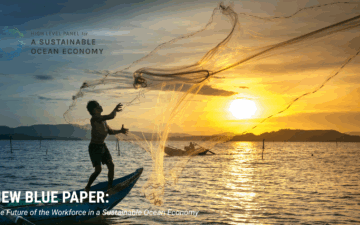Reflections from World Ocean Week 2025
As I write this, I am struck by the convergence of conversations I’ve had this week. From the Blue Economy Finance Forum in Monaco to the UBS Nature Finance Conference in London, and finally at the 3rd UN Ocean Conference in Nice, the message has been remarkably consistent across continents and cultures. The smart money is moving toward the sustainable blue economy. It is not driven by sentiment—it is driven by returns.
World Ocean Day on June 8th marked the start of what became an intense week of discussions on blue economy finance. From the questions and comments during and after my four speaking opportunities across three major conferences, one thing has become crystal clear. The financial community is waking up to the fundamental truth that environmental scientists have known for decades: the health of our ocean directly correlates with the health of corporate balance sheets.
It’s About Value, Not Values
The blue economy—the sustainable subset of ocean-related economic activities—represents one of the most compelling investment opportunities of our time. Not because of ideology, but because of cold, hard financial data. While the broader $2.5 trillion ocean economy includes everything from offshore oil to cruise ships, the sustainable blue economy is projected to reach $3.2 trillion by 2030, consistently outperforming both the traditional ocean economy and broader market indices.
This reality hit home during our launch of the Malta Manifesto on Potentially Polluting Wrecks. What began as an environmental initiative quickly revealed itself as a massive financial opportunity. The thousands of wrecks littering our ocean floors aren’t just ecological hazards—they’re material risks to marine industries, coastal tourism, and insurance markets. Companies that proactively address these risks are positioning themselves for competitive advantages that their less observant peers have yet to recognize.
The Blue Economy’s Financial Reality
Blue economy investing isn’t just about saving whales—it’s about capturing the sustainable portion of ocean commerce that’s dramatically outperforming traditional ocean industries. The numbers don’t lie. Companies with strong marine stewardship practices consistently outperform their peers.
In Monaco, in Nice, and in London, conversations with people from more than thirty countries across six continents reinforced this point. Why would any serious investor want less material data about any risks, much less ocean-related risks? The effects of climate change, overfishing, pollution, and regulatory changes pose significant financial challenges for unprepared companies. Conversely, businesses that proactively address these challenges through sustainable blue economy practices are positioning themselves for sustained competitive advantages.
At the UBS Nature Finance Conference (London), portfolio managers shared data showing consistent outperformance from companies with strong ocean stewardship practices. This isn’t correlation—it’s causation driven by operational advantages, regulatory positioning, and brand premiums that flow directly to shareholder returns.
Material Ocean Risks That Impact Your Portfolio
The financial implications of ocean-related risks are both immediate and significant. Take the shipping industry, where new maritime regulations can compel companies to spend millions on retrofits and operational changes overnight. During the Blue Economy Finance Forum, we heard case studies of shipping companies that had anticipated these changes versus those caught flat-footed—the performance differential was stark and measurable.
Seafood companies confront even harsher realities as overfished stocks directly squeeze their supply chains and diminish pricing power. Meanwhile, sea-level rise isn’t a distant threat—it’s already affecting coastal real estate values and infrastructure investments today. The insurance executives I spoke with in Nice were unanimous: ocean-related risks are repricing entire market sectors.
The social dynamics are equally material to business performance. Shipping and fishing companies with poor labor practices are increasingly facing consumer boycotts and regulatory scrutiny, both of which directly impact revenue. Coastal businesses have learned that they cannot operate effectively without support from the local community since operational licenses and market access depend on these relationships. The transparency revolution in supply chains has created premium pricing opportunities for companies that can trace their seafood products, while those that cannot face margin compression.
Strong governance translates directly into risk management advantages in the complex world of ocean business. Well-governed companies navigate the maze of international maritime laws more effectively, avoiding costly violations that regularly sink their competitors’ quarterly results. They also invest strategically in marine technology innovation, positioning themselves ahead of regulatory curves and capturing first-mover advantages in emerging markets.
The Investment Opportunity
Ocean-centric companies with strong environmental and social practices aren’t just doing good—they’re delivering superior risk-adjusted returns through measurable operational advantages. Advanced monitoring systems are cutting fuel costs and optimizing shipping routes, while sustainable fishing practices ensure long-term supply security that their competitors lack.
The premium pricing story is particularly compelling. Consumers consistently pay more for certified sustainable seafood, and companies with clean ocean reputations command brand premiums that flow directly to the bottom line. These aren’t feel-good marketing campaigns—they’re revenue drivers with measurable impact on profit margins.
Perhaps most importantly, businesses that stay ahead of environmental regulations avoid the costly scrambles that devastate their competitors when new rules inevitably arrive. They’re also capturing first-mover advantages in rapidly growing markets, such as offshore renewable energy and aquaculture automation, positioning themselves as innovation leaders rather than regulatory followers.
The Malta Manifesto discussions revealed another dimension: companies that address legacy environmental liabilities, such as potentially polluting wrecks, aren’t just managing risk—they’re creating new revenue streams through remediation technologies and services that will define the next decade of ocean business.
Real Returns from Blue Investments
The data is compelling: maritime companies with strong environmental practices show 15% better stock performance over five-year periods. Sustainable seafood companies trade at premium valuations. Offshore renewable energy investments are delivering double-digit returns.
This isn’t theory—it’s measurable financial outperformance driven by material business advantages. Across all three conferences this week, the institutional investors I met shared remarkably similar performance data, regardless of their geographic focus or investment mandate.
A Non-Partisan Investment Discipline
Ocean-centric investing succeeds because it focuses on fundamental business realities. The ocean doesn’t care about ideology—physics, chemistry, and biology govern its systems. Those systems are at their best when least disrupted by harmful human activities, the same activities that increase economic risk. Companies that understand and adapt to these realities create shareholder value. Those that don’t face rising costs and shrinking opportunities.
This point resonated across cultures and political systems. Whether speaking with European pension fund managers, American family offices, or Asian sovereign wealth funds, the investment thesis remained consistent: ocean health equals financial health.
Savvy investors ask: Why would you ignore material information about regulatory risks, resource availability, and competitive positioning just because some call it “environmental”?
The Bottom Line
Blue economy investing provides additional insight to make more informed investment decisions about companies whose fortunes rise and fall with the health of marine ecosystems. It’s about maximizing returns through comprehensive risk analysis that captures opportunities traditional metrics miss.
The sustainable blue economy is growing faster than both the broader ocean economy and the global economy as a whole. The question isn’t whether to invest in blue economy opportunities—it’s whether you’ll identify and capture the best ones before your competition does.
After fourteen days, ten flights, and countless conversations with the world’s leading blue economy finance professionals, one conclusion emerges clearly: the convergence of World Ocean Day with these three major conferences wasn’t coincidental. It signals a fundamental shift in how global capital markets view sustainable ocean-related investments.
Because ultimately, it’s about value, not values. And the ocean delivers both.
Blue economy investing represents a rapidly evolving investment discipline focused on sustainable ocean activities. Like all investments, blue economy strategies carry risks and may not be suitable for all investors. Mark J. Spalding advises the UBS Rockefeller Ocean Engagement Fund (past performance does not guarantee future results).







